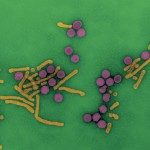Lien vers Pubmed [PMID] – 18378678
J. Biol. Chem. 2008 May;283(22):15201-8
The LIM-only protein FHL2 acts as a transcriptional modulator that positively or negatively regulates multiple signaling pathways. We recently reported that FHL2 cooperates with CREB-binding protein/p300 in the activation of beta-catenin/T cell factor target gene cyclin D1. In this paper, we demonstrate that FHL2 is associated with the cyclin D1 promoter at the T cell factor/CRE site, providing evidence that cyclin D1 is a direct target of FHL2. We show that deficiency of FHL2 greatly reduces the proliferative capacity of spontaneously immortalized mouse fibroblasts, which is associated with decreased expression of cyclin D1 and p16(INK4a), and hypophosphorylation of Rb. Reexpression of FHL2 in FHL2-null fibroblasts efficiently restores cyclin D1 levels and cell proliferative capacity, indicating that FHL2 is critical for cyclin D1 activation and cell growth. Moreover, ectopic cyclin D1 expression is sufficient to override growth inhibition of immortalized FHL2-null fibroblasts. Gene expression profiling revealed that FHL2 deficiency triggers a broad change of the cell cycle program that is associated with down-regulation of several G(1)/S and G(2)/M cyclins, E2F transcription factors, and DNA replication machinery, thus correlating with reduced cell proliferation. This change also involves down-regulation of the negative cell cycle regulators, particularly INK4 inhibitors, which could counteract the decreased expression of cyclins, allowing cells to grow. Our study illustrates that FHL2 can act on different aspects of the cell cycle program to finely regulate cell proliferation.


